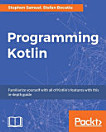Android Development with Kotlin
ამ ელწიგნის შესახებ
This book is for developers who have a basic understanding of Java language and have 6-12 months of experience with Android development and developers who feel comfortable with OOP concepts.
What You Will LearnRun a Kotlin application and understand the integration with Android StudioIncorporate Kotlin into new/existing Android Java based projectLearn about Kotlin type system to deal with null safety and immutabilityDefine various types of classes and deal with propertiesDefine collections and transform them in functional wayDefine extensions, new behaviours to existing libraries and Android framework classesUse generic type variance modifiers to define subtyping relationship between generic typesBuild a sample applicationIn DetailNowadays, improved application development does not just mean building better performing applications. It has become crucial to find improved ways of writing code. Kotlin is a language that helps developers build amazing Android applications easily and effectively. This book discusses Kotlin features in context of Android development. It demonstrates how common examples that are typical for Android development, can be simplified using Kotlin. It also shows all the benefits, improvements and new possibilities provided by this language.
The book is divided in three modules that show the power of Kotlin and teach you how to use it properly. Each module present features in different levels of advancement. The first module covers Kotlin basics. This module will lay a firm foundation for the rest of the chapters so you are able to read and understand most of the Kotlin code. The next module dives deeper into the building blocks of Kotlin, such as functions, classes, and function types. You will learn how Kotlin brings many improvements to the table by improving common Java concepts and decreasing code verbosity. The last module presents features that are not present in Java. You will learn how certain tasks can be achieved in simpler ways thanks to Kotlin.
Through the book, you will learn how to use Kotlin for Android development. You will get to know and understand most important Kotlin features, and how they can be used. You will be ready to start your own adventure with Android development with Kotlin.
შეფასებები და მიმოხილვები
ავტორის შესახებ
Marcin Moskala is an experienced Android developer who is always looking for ways to improve. He has been passionate about Kotlin since its early beta release. He writes articles for Trade press and speaks at programming conferences. Marcin is quite active in the programming and open source community and is also passionate about cognitive and data science. You can visit his website, or follow him on GitHub (MarcinMoskala) and on Twitter (@marcinmoskala).
Igor Wojda is an experienced engineer with over 11 years of experience in software development. His adventure with Android started a few years ago, and he is currently working as a senior Android developer in the healthcare industry. Igor has been deeply interested in Kotlin development long before the 1.0 version was officially released, and he is an active member of the Kotlin community. He enjoys sharing his passion for coding with developers. To learn more about him, you can visit on Medium (@igorwojda) and follow him on Twitter (@igorwojda).




